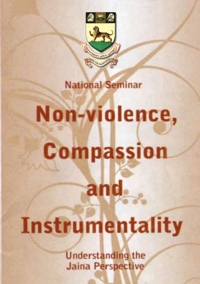Chennai 2009: Non-violence, Compassion and Instrumentality - A Jaina Perspective
 | Non-violence, Compassion and InstrumentalityA Jaina PerspectiveSeminar organized by the Department of Jainology of the University of Madras, 13 and 14 February 2009 Chennai, India |
13.02.2009
The Concept of ‘Ahiṁsā’ in Jainism and in Christianity
Introduction
It is generally accepted as a fact that the last of the Jaina Tīrthaṅkaras, Lord Mahāvīra, was an older contemporary of Gautama Sākya Muni, Lord Buddha. It is also an accepted truth that Lord Parśvanātha, who was the twenty-third Tīrthaṁkara was a historical person. Jainism is the religion of ahiṁsā which means non-violence which is as old as the Vedic Tradition. We need to give a very special notice that there is a reference to Ṛṣabha Deva and to Ariṣṭanemi who are the Jaina Tīrthaṅkaras in the Ṛg Vedic mantras. The excavations at Harappa and Mohenjo-daro in the region of the ancient Indus River have brought to light that on the seals and coins dug out from these places are found figures resembling the Jaina Tīrthaṅkaras.
The root of the Jaina darśana is ahiṁsā
There is no need to attach any importance to the distinction between āstika darśana [viewpoint] and nāstika darśana. According to Jainas, the ahiṁsā dharma and the Vedic ritualism cannot go together. The Vedic ritualism involved in animal sacrifice, and the Jaina darśana extremely rejects the same, and it is misleading to call Jainism as a nāstika darśana. In the case of Sāṁkhya darśana [school of philosophy] it openly rejects the creation theory and it ridicules the doctrine of the creator of the universe. Neither can we find a creation theory in Pūrva Mīmāṁsā and in Uttara Mīmāṁsā. In Uttara Mīmāṁsā or Vedānta, the world is interpreted as a māyāvic manifestation of the Ultimate Brahman, not the result of evolution or creation. Therefore, the Jaina darśana [religion] is rooted in ahiṁsā, other than the Vedic ritualism.
Man destroys nature
Jaina philosophy is dualistic, believing in the separate existence of soul and matter. Its ethics is based upon the principles of ahiṁsā and it tries to produce men who have no tendency to do violence to any creature - let alone to a brother human being. Man destroys the nature and therefore it is regarded that people are wicked because they destroy the seeds for the sake of their own pleasure (Sūtrakṛtāṅga 1.7.8-9). Jainas realized the truth that plants and animals have their life and just like human beings they too have pain and pleasure more than 2500 years ago (Āchāraṅga 1-1.5.7, 1.6.6., 2.6.5). Both Jainas and Christians realize that man destroys nature. Apostle Paul says in Romans 8:22: “For we know that the whole creation groaneth and travaileth in pain together until now.”
Pain is something unavoidable
Both Jainas and Christians believe that all living beings in this world seem to suffer. In this world there are fixed laws and if we violate it then we have to suffer. According to Christianity, God created this world with laws and if we violate these, the problem starts. God did not invent pain and suffering. Jesus tells a story that on the way to Jericho a man was robbed and wounded by thieves. A good Samaritan found the wounded man on the way and poured oil in his wounds and took him to an inn and helped him. God is like a Good Samaritan, ready to help people who are wounded and face pain in life. Apostle Paul says in Romans 5:12: “Sin entered the world through one man (Adam) and....all sinned.”
Christianity teaches that one should love one’s neighbor as one loves oneself. In real life, our jealousies and quarrels are more rampant with our neighbors or relatives than with others. The law of sociology is: “Hate thy neighbor.” Christianity teaches that if one slaps us on one cheek, we should turn him the other one. This is against our natural aggressiveness in political, social, and economic life.
Peace and tolerance
Peace and tolerance are inherent in Jaina philosophy and this has made a significant contribution to wider Indian Philosophy.
Religion is described as a “way of life.” A religion is a set of beliefs and practices generally held by a community and it is also believed as a communal system with a set of beliefs focusing on a system of thought, unseen existence of persons or objects which are considered to be ‘supernatural,’ sacred, divine, or belong to the Supreme Truth. It is involved with codified beliefs and rituals. It is also a study of ancestral or cultural traditions, writings, history, and mythology, as well as with personal faith and mystic experiences. The term “religion” refers to both the personal practices related to communal faith and to group rituals and communication stemming from shared conviction.
Conclusion
There is no doubt that the punishment to men is a form of suffering. If a just man is punished then it is even more suffering. Every punishment is the consequence of some wrong action done by an individual and every consequence is afflictive to that person. The afflictive consequence brings pain or sorrow. How to counteract our wrong doings? Here, Jains give the solution of practicing ahiṁsā. Therefore, the negative movement of every suffering is the sovereign movement of restoration. Plato indicates that: “True punishment is that which, in restoring order, produces happiness.” This is the meaning of the famous paradoxes in Plato’s Gorgias: “The unjust man is not happy” (47 Id); “To escape punishment is worse than to suffer it” (474b); “To suffer punishment and pay the penalty for our fault is the only way to be happy.” In Christianity we see that Jesus Christ, who is a perfect example, practiced ahiṁsā in all situations and he advices us that we should “love our enemy.” Therefore, both Jainism and Christianity teach that ‘ahiṁsā’ is to be practiced by all.

 J. Srinivasan
J. Srinivasan